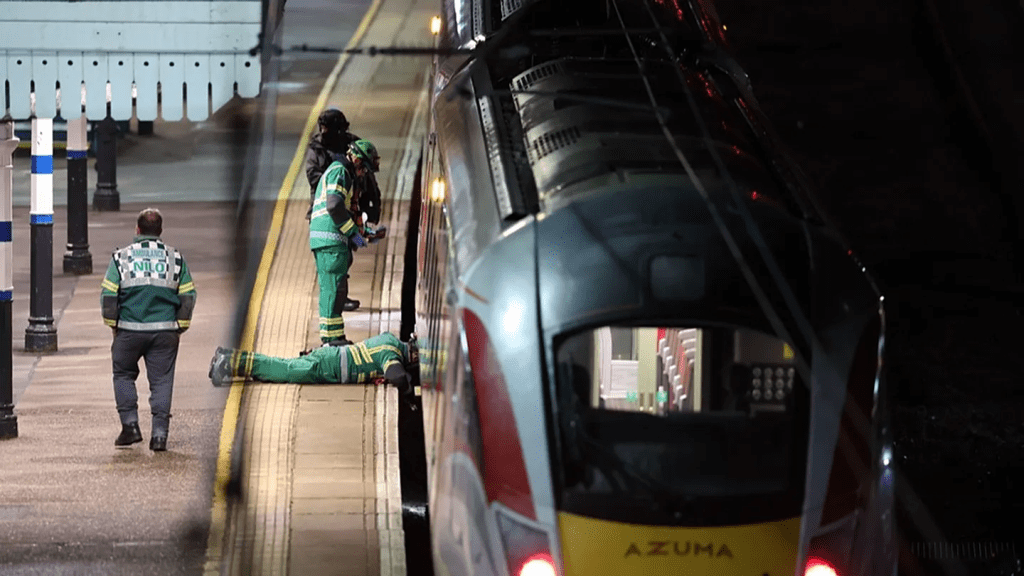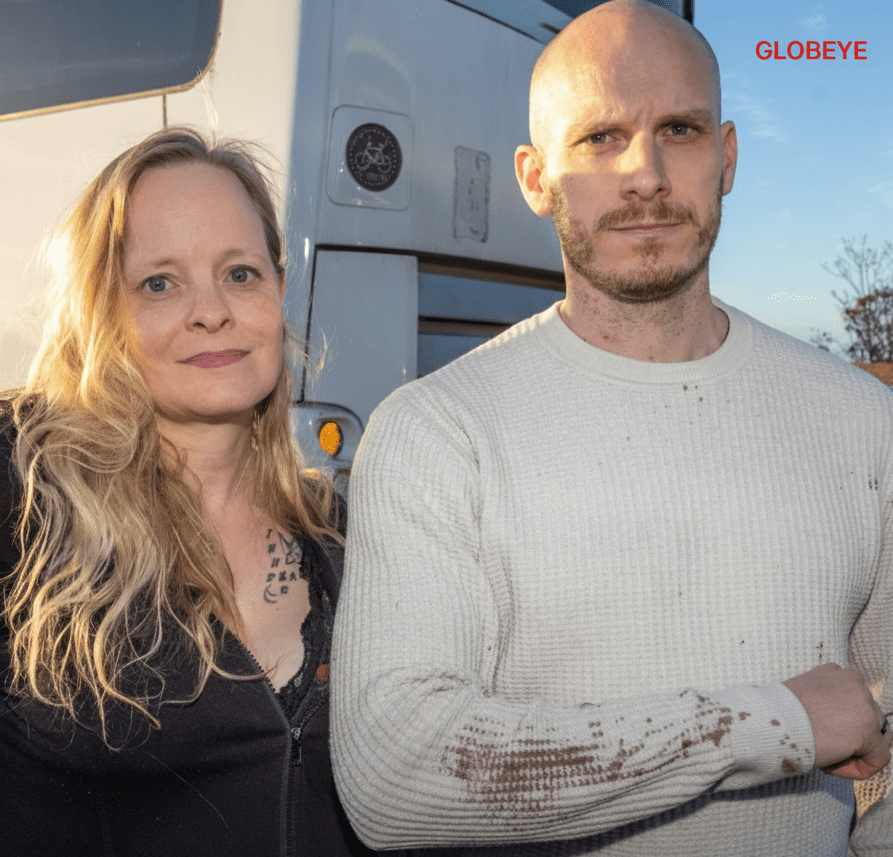She Begged for Her Life on a London-Bound Train — Then the Attacker Stopped, Looked Her in the Eye, and Said, “The Devil’s Not Going to Win”
It was just after 7:30 p.m. on November 1, 2025, when an ordinary evening train from Peterborough to London became the scene of unimaginable horror. Passengers settling into their seats for the routine journey through the English countryside had no idea that within minutes, chaos and terror would consume the carriage. Among them was 48-year-old Dayna Arnold — who would soon find herself begging for her life as a man armed with a knife began slashing at random, attacking anyone in his path.
Witnesses say it started suddenly. The attacker stood up from his seat, his movements calm at first. Then, without warning, he drew a long knife and began stabbing passengers with chilling precision. Screams echoed down the narrow train car as people scrambled to escape. “He was just slashing at anyone he could find,” one eyewitness said later. “There was blood everywhere, people crying, ducking under seats — it was like a war zone in seconds.”

Arnold had been chatting quietly with a friend when she saw the panic break out at the other end of the car. She turned and saw the blade flash. “It didn’t feel real,” she recalled. “You never think something like that will happen in front of you.” As passengers rushed to the aisles, she and her friend tried to duck for cover, but in the confusion, she tripped and fell against a row of seats. By the time she stood up, the attacker was there.
What happened next still haunts her. She looked up and pleaded, “Please, don’t.” The man stopped for a moment, eyes locked on hers, knife raised. For a brief, terrible instant, everything went quiet. Then he lowered the blade, turned away, and moved toward another passenger. A minute later, he returned, paused again, and said something that sent chills through the survivors who heard it. “The devil’s not going to win,” he told her — before walking away again.
For Arnold, those words have replayed in her head ever since. “It didn’t make sense at the time,” she said later. “But in that moment, I thought — maybe that’s why I’m still alive.”
As police rushed to the scene, the train came to an emergency stop near Huntingdon in Cambridgeshire. Officers stormed the carriages, ordering passengers to the floor and subduing the suspect with stun weapons. Eleven people were injured in the attack, two of them critically. One young man, barely in his twenties, suffered multiple stab wounds to his arm and chest. Arnold’s friend helped him by wrapping a belt around his upper arm as a makeshift tourniquet until paramedics arrived.

Authorities later arrested the suspected attacker, described as a tall man in dark clothing with braided hair. Another man was detained briefly but released after questioning. The motive for the attack remains unclear, though investigators have said they are not treating it as terrorism. Early reports suggest the attacker had been behaving erratically before the violence began, muttering to himself and pacing between seats.
For the passengers trapped in that carriage, every second felt like an eternity. Witnesses described passengers trying to break windows, huddling under seats, and calling loved ones as the attack unfolded. “I thought I was going to die,” Arnold said. “I remember thinking about my family and whether I’d ever see them again.”
When the train finally stopped and police burst in, Arnold ran with the others toward safety, her legs shaking, her heart pounding. The image of the knife, the screams, and those chilling words — “The devil’s not going to win” — would stay with her forever.
In the days since, Arnold has been hailed for her calm composure and for helping fellow passengers in the aftermath. She refuses to see herself as a hero. “I was just lucky,” she said. “There were others who were hurt worse, and people who were brave enough to help when they could have run.”

Experts who study public trauma say experiences like Arnold’s often leave lasting scars, even when survivors escape physical harm. “She survived physically, but the emotional toll of witnessing something so brutal can last for years,” said one trauma counselor. “These attacks often feel senseless — that’s what makes them hardest to process.”
Knife attacks in public places have been a rising concern in the United Kingdom in recent years, though incidents on trains remain relatively rare. Police have increased patrols and are reviewing security footage from multiple angles to piece together the attacker’s movements before and after the incident.
For those who lived through it, though, no investigation can fully erase the memory of what happened inside that carriage. “I still see it when I close my eyes,” Arnold admitted. “The way he looked at me. The way everyone screamed. It’s not something you forget.”

She has spoken of the survivor’s guilt that often follows such experiences — the feeling of asking, why me? Why did he spare me when others weren’t so lucky? “I keep thinking about that young man,” she said softly. “The one who was bleeding so badly. My friend helped him. I wish I could have done more.”
The community around Huntingdon has rallied to support the survivors, organizing donations and counseling for those affected. Emergency responders who arrived within minutes of the first distress call have been praised for their swift action. One paramedic described the scene as “chaotic but miraculous — people who should not have made it, did.”
For Dayna Arnold, recovery is now a slow and private process. She has returned home, grateful to be alive but struggling with flashbacks. Her nights are restless. Loud noises startle her. “Sometimes I feel like I’m back on that train,” she said. “But I remind myself that I’m not. I made it out.”
She has found strength in small moments — morning walks, phone calls with her family, and the quiet comfort of normal life. “It makes you see the world differently,” she reflected. “You don’t take anything for granted anymore. Even something as simple as watching the sunset feels like a blessing.”

While the investigation continues, authorities have urged the public not to speculate on the attacker’s motive. For now, they say, the focus is on the victims and their recovery. As Arnold and others try to rebuild, their courage and composure stand as a reminder of resilience in the face of terror.
The image that endures — of a woman facing death and hearing the words, “The devil’s not going to win” — has taken on a strange, haunting symbolism. It is both a threat and a paradox, a fragment of madness that somehow saved her life. For Arnold, it is also a phrase that she has reclaimed in her own way. “I’ve started saying it myself,” she said. “Not because of what he meant — but because I survived. Maybe he was wrong. Maybe the devil really didn’t win.”
In the end, this story is not about fear, but about endurance — the will to live, to keep going, to hold onto faith in humanity even after witnessing its darkest edge. The passengers on that train will carry the memory forever. Yet for survivors like Dayna Arnold, that memory is also proof of something greater: the unbreakable instinct to fight for life, even when confronted with death itself.


